【中考夺分】安徽省2015中考英语复习课件:七年级下册(共85张ppt)
文档属性
| 名称 | 【中考夺分】安徽省2015中考英语复习课件:七年级下册(共85张ppt) | 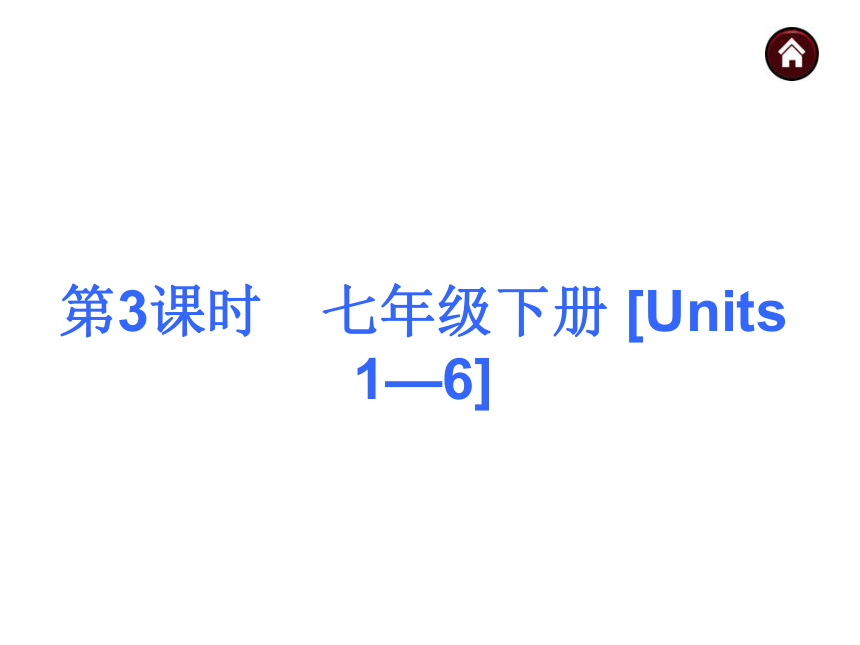 | |
| 格式 | zip | ||
| 文件大小 | 72.7KB | ||
| 资源类型 | 教案 | ||
| 版本资源 | 通用版 | ||
| 科目 | 英语 | ||
| 更新时间 | 2014-12-29 15:59:00 | ||
图片预览

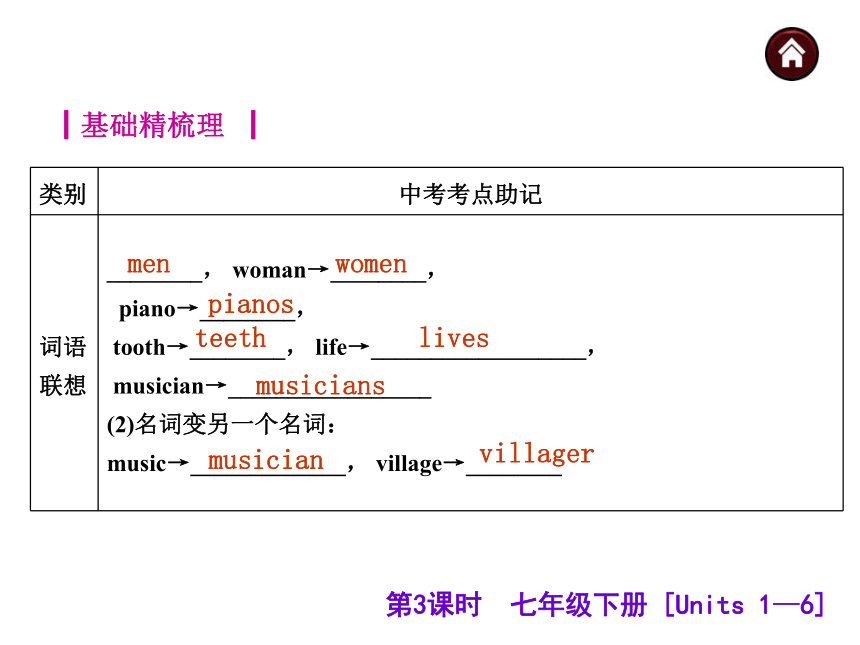
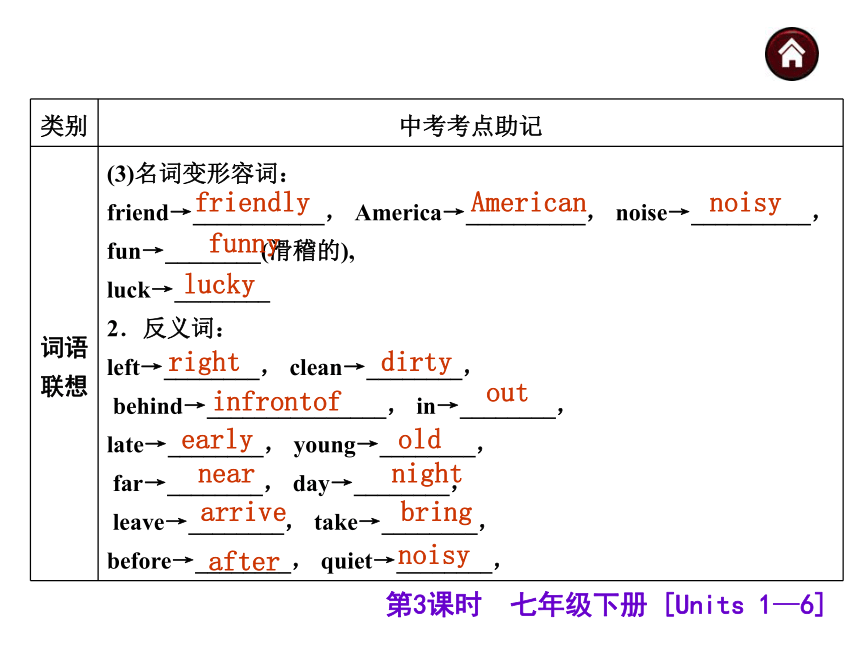
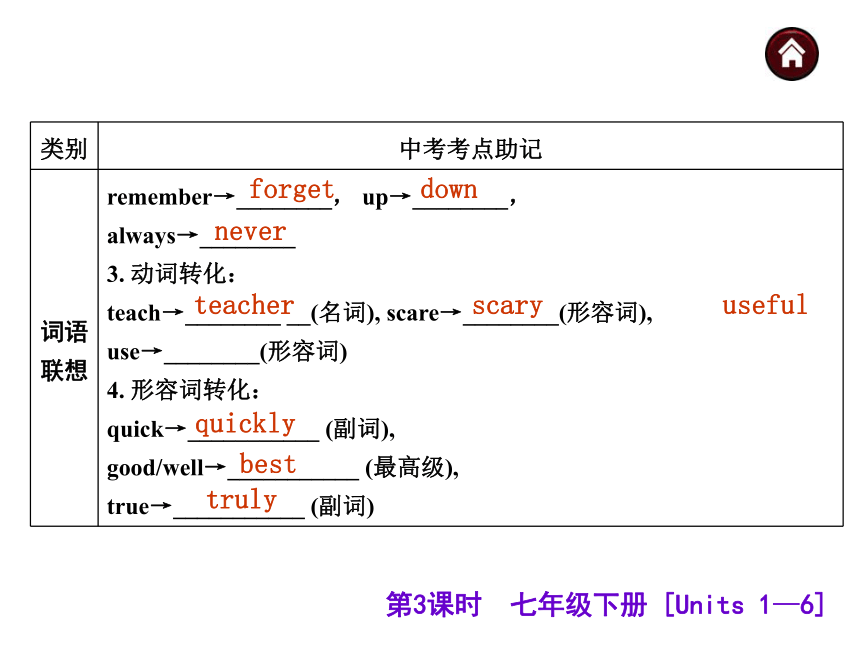
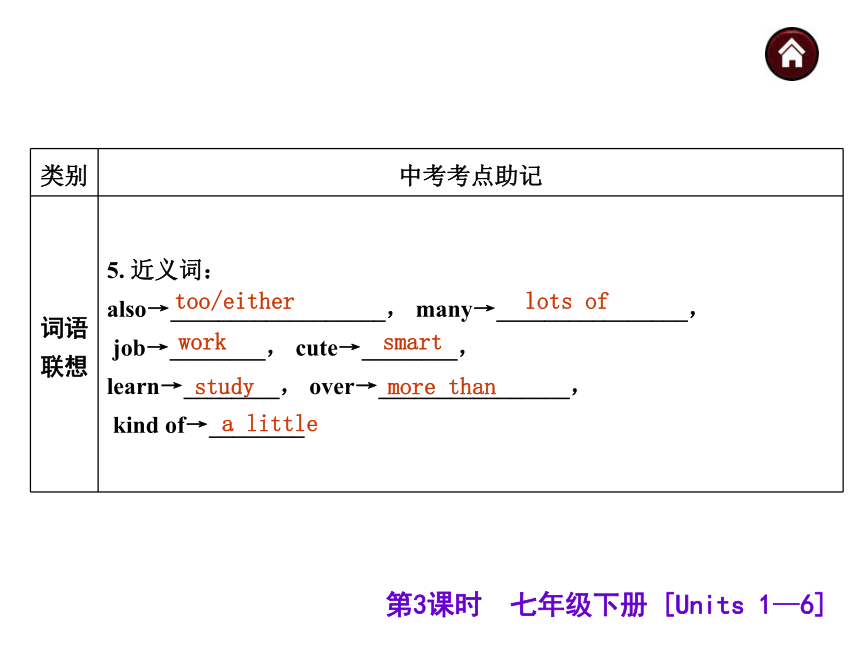
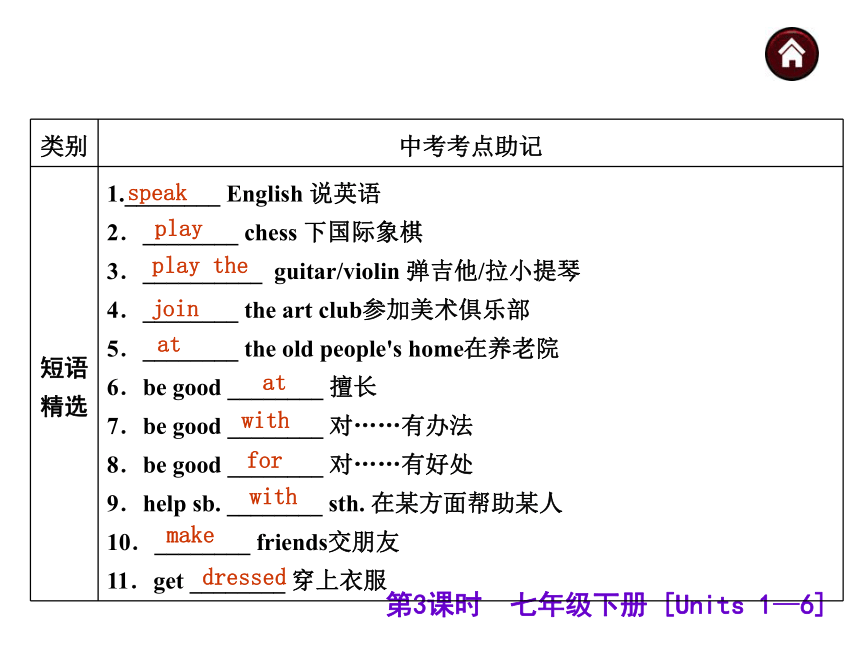
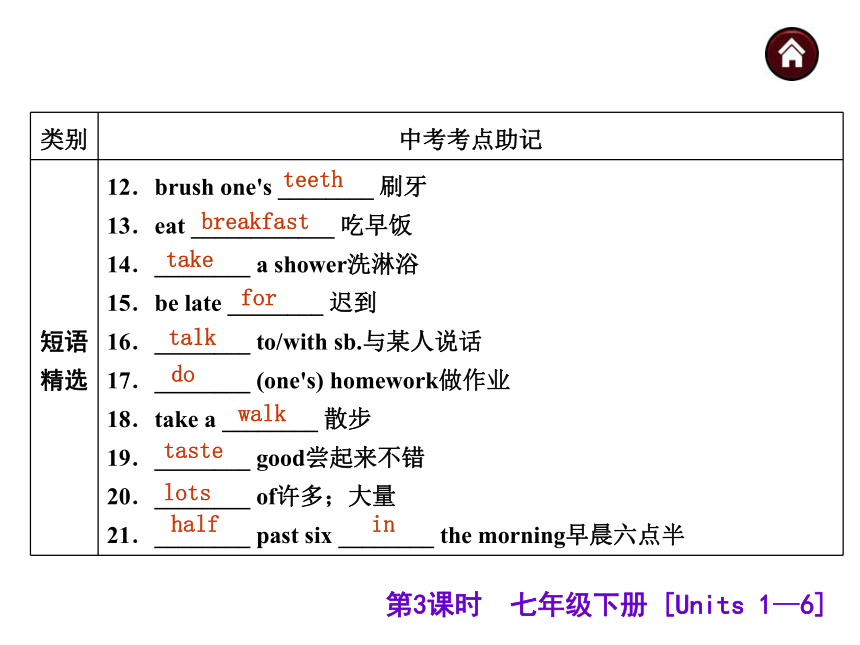
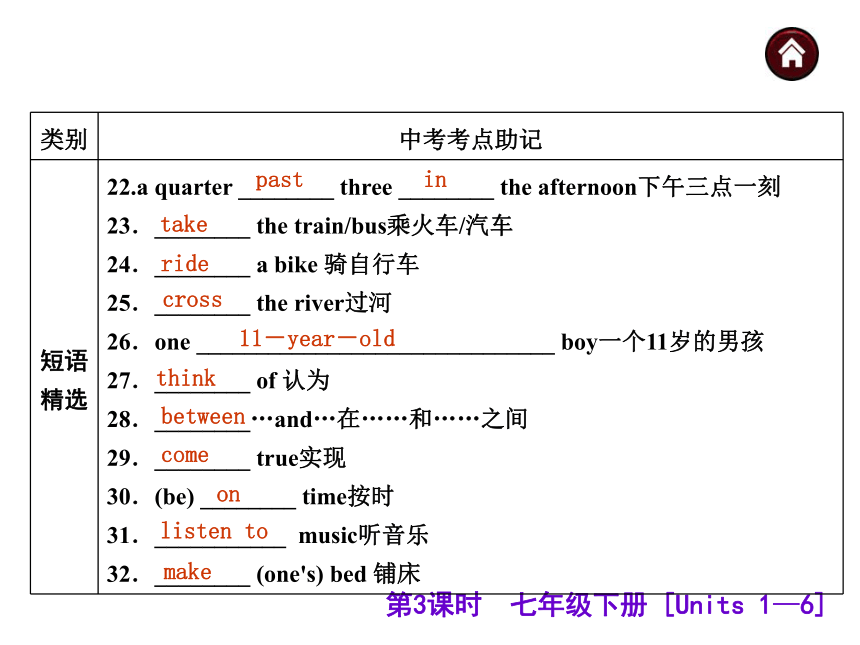
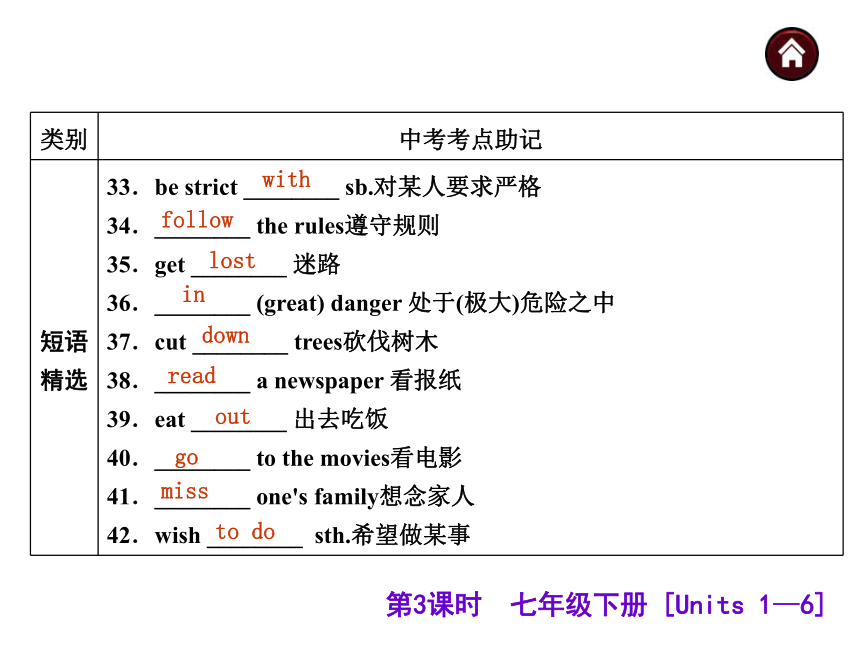
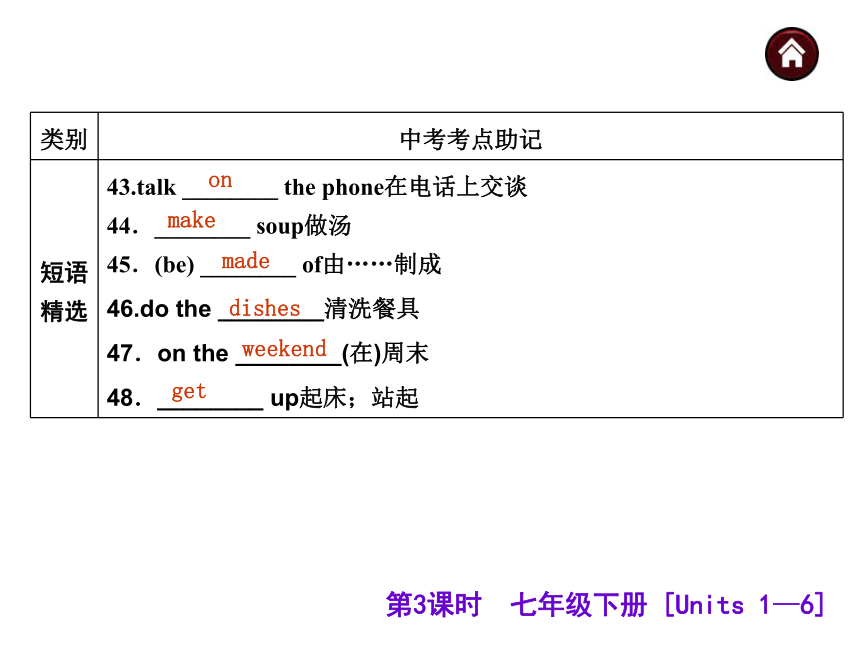
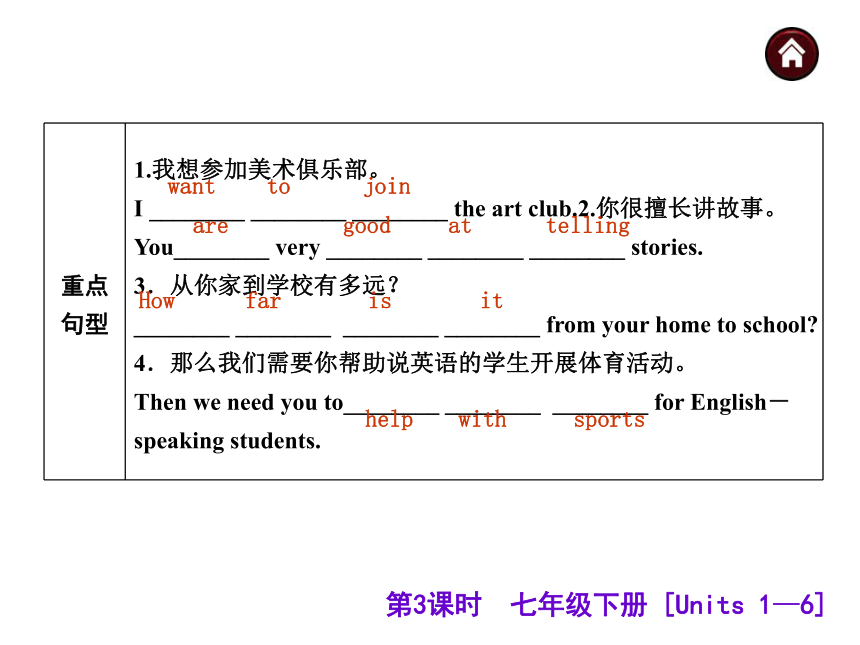
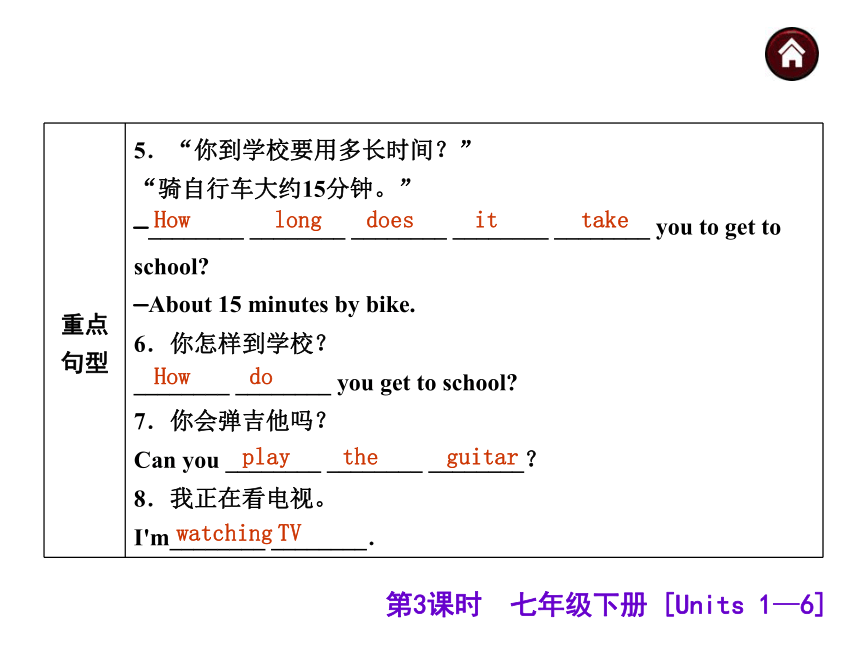
文档简介
课件85张PPT。第3课时 七年级下册 [Units 1—6]第3课时 七年级下册 [Units 1—6]┃基础精梳理 ┃men womenpianosteethlivesmusiciansmusicianvillager第3课时 七年级下册 [Units 1—6]friendlyAmericannoisyfunnyluckyrightdirtyinfrontofoutearlyoldnearnightarrivebringafternoisy第3课时 七年级下册 [Units 1—6]forgetdownneverteacherscaryusefulquicklybesttruly第3课时 七年级下册 [Units 1—6]too/eitherlots ofworksmartstudymore thana little第3课时 七年级下册 [Units 1—6]speakplayplay thejoinatatwithforwithmakedressed第3课时 七年级下册 [Units 1—6]teethbreakfasttakefortalkdowalktastelotshalfin第3课时 七年级下册 [Units 1—6]pastintake ride cross 11-year-old thinkbetweencomeonlisten tomake第3课时 七年级下册 [Units 1—6]withfollowlostindownreadoutgomissto do第3课时 七年级下册 [Units 1—6]onmakemadedishesweekendget第3课时 七年级下册 [Units 1—6]
wanttojoinaregoodattellingHowfaris ithelpwithsports第3课时 七年级下册 [Units 1—6]
HowlongdoesittakeHowdoplaytheguitarwatchingTV第3课时 七年级下册 [Units 1—6]第3课时 七年级下册 [Units 1—6]┃考点巧突破┃考点1 some/any some和any都意为“一些”,修饰可数名词或不可数名词。区别如下:巧辩异同第3课时 七年级下册 [Units 1—6]Give me some tea. 给我一些茶。
Are there any desks in the classroom?
教室里有课桌吗?
There are not any trucks on the road.
公路上没有卡车。
You may come any day you like.
你随便哪天来都行。第3课时 七年级下册 [Units 1—6]考点2 how often/how long/how soon/how far 第3课时 七年级下册 [Units 1—6]考点3 have to/must 两词都是“必须”的意思。
(1)have to 表示客观的需要,must 表示说话人主观的看法,即主观上的必要。
(2)have to有人称、数、时态的变化,而must只有一种形式。
He is ill, so he has to stay at home.
他病了,因此必须待在家里。第3课时 七年级下册 [Units 1—6](3)在否定结构中, don't have to 表示“不必”,mustn't 表示“禁止”。
You don't have to worry about him.
你不必担心他。第3课时 七年级下册 [Units 1—6]考点4 wear/put on/dress/in 第3课时 七年级下册 [Units 1—6]考点5 arrive/get/reach 三者均可表示“到达”的意思,区别如下:
(1)arrive为不及物动词,后接宾语时需加介词at或in。arrive at 后接较小的地点,arrive in 后接较大的地点。
We arrived at the station five minutes late.
我们到车站晚了5分钟。
They will arrive in Paris next Monday.
他们将于下周一到达巴黎。 第3课时 七年级下册 [Units 1—6](2)get后接宾语时,需加介词to。
When we got to the park, it began to rain.
当我们到达公园时,天开始下雨。
(3)reach通常是及物动词,可以直接接宾语。
He reached Beijing yesterday. 他昨天到达了北京。
When did he reach home yesterday?
昨天他什么时候到家的?
[注意] 后接副词时,arrive和get 后均不加介词。第3课时 七年级下册 [Units 1—6]考点6 leave/forget leave和forget都可以表示“忘记”,但用法不同:“leave sth.+地点”表示“把某物落在某地”;forget sth.后不接地点。
I left my computer on the bus.
我把电脑落在公交车上了。
Sorry, I forgot the money.
对不起,我忘带钱了。
[拓展] leave for sp.表示“前往某地”。第3课时 七年级下册 [Units 1—6]考点7 sleepy/sleep/asleep (1)sleepy是形容词,意为“想睡的,困倦的”,可用作定语或表语。
He goes to bed very late every day, so he often feels sleepy.他每天睡得很晚,因此经常感到困倦。
(2)sleep既可作动词,又可作名词。
He had a good sleep last night.=He slept well last night. 昨晚他睡了个好觉。第3课时 七年级下册 [Units 1—6](3)asleep作形容词时,意为“睡着的”,用作表语,常用短语为fall asleep,意为“入睡”。
He was very tired and fell asleep soon.
他很累,很快就睡着了。第3课时 七年级下册 [Units 1—6]考点8 be good for/be good at/be good to/be good with (1)be good for意为“对……有好(益)处”,反义词组是be bad for(对……有害处)。
Eating too much is not good for your health.
吃得太多对你的健康没有好处。
(2)be good at意为“在……方面(学得,做得)好,擅长……”,近义词组为do well in。
Some of us are good at swimming.
我们中有些人擅长游泳。第3课时 七年级下册 [Units 1—6](3)be good to=be kind/friendly to,意为“对……仁慈(和善)”。
The old man is very good to the children.
那位老人对孩子们很和善。
(4)be good with=get on well with,意为“与……相处融洽”。
Mr. Smith is good with his neighbors.
史密斯先生和他的邻居们相处融洽。 第3课时 七年级下册 [Units 1—6]考点9 much too/too much/too many 第3课时 七年级下册 [Units 1—6]考点10 kind of/a kind of/all kinds of (1)kind of表示“有点儿,有几分,稍微”,后面接形容词。
I'm kind of hungry. 我有点儿饿了。
(2)a kind of表示“(某类中的)一种”,作定语,后面接名词。
a kind of animal一种动物 a kind of car一种小汽车
(3)all kinds of表示“各种各样的”,后面接名词复数,“all kinds of+名词复数”作主语时,谓语动词用复数。第3课时 七年级下册 [Units 1—6]┃智能双提升┃基础过关Ⅰ.单词拼写
根据首字母及汉语提示,完成下列单词的拼写,使句意明确,语言通顺。
1.Xinjiang food t________ (品尝) delicious. Most people like eating it.
2.It's very dangerous to d________ (驾驶) after you drink wine.astesrive第3课时 七年级下册 [Units 1—6]3.If your dream comes t________ (实现), you must be happy.
4.Some students have to w________ (戴)glasses in class because they can't see the blackboard clearly.
5.My home isn't f________ (远的)from the school. It is only ten minutes' walk.rueearar第3课时 七年级下册 [Units 1—6]Ⅱ.单项填空
1. —What time do you go to bed ________ weekends?
—________ about 10:00 p.m.
A. for; At B. of; In C. on; At D. on; InC在周末用介词on;在具体时刻前用at。第3课时 七年级下册 [Units 1—6]2. —Why don't you like lions?
—Because they are kind of ________.
A. friendly B. scary
C. beautiful D. smartB 根据上句中“不喜欢”狮子可知应该选B。第3课时 七年级下册 [Units 1—6]3. —What do you think of Rose?
—She's a lazy girl. She ________ helps her mother do things at home.
A. always B. usually C. never D. sometimesC根据答语中“她是一个懒惰的女孩”可知她“从不”帮妈妈做事情。第3课时 七年级下册 [Units 1—6]4. —Do you want to go to the zoo on Saturday ________ Sunday?
—On Sunday. I have no time on Saturday.
A. and B. but C. so D. orD第3课时 七年级下册 [Units 1—6]5. —We'll have a soccer game next Sunday. Do you want to ________ us, John?
—Sure. I like soccer. A. join B. leave
C. miss D. teachA第3课时 七年级下册 [Units 1—6]6. It ________ Mr. Brown half an hour to clean the house every day.
A. makes B. takes C. keeps D. bringsB考查“it takes sb. some time to do sth. ”句型。第3课时 七年级下册 [Units 1—6]1. [2014·遵义改编] —________ is it from Zunyi to Guiyang?Hope we can arrive in 2 hours.
—About 150 kilometers.
A. How soon B. How long C. How far D. How many中考透视C根据答语可知上句是对距离提问,故用how far,意为“多远”。第3课时 七年级下册 [Units 1—6]2.[2013·重庆] —Excuse me, where did you get the book?
—I borrowed it from the________.
A. cinema B.library
C.park D.stationB第3课时 七年级下册 [Units 1—6]3.[2013·广安改编] —What's your teacher like?
—She is always strict ________ us.
A. in B.with
C.to D.onB第3课时 七年级下册 [Units 1—6]4.[2014·达州] —I'm sorry I ________ my exercise book at home this morning.
—It doesn't matter. Don't forget ________ it here this afternoon.
A.left; to take B.forgot; bringing
C.left; to bring D.forgot; to bringC第3课时 七年级下册 [Units 1—6]5.[2013·绍兴] —Can Peter play games with us, Mrs. Hawking?
—Wait a minute. He ________ a shower.
A. is taking B.takes
C.took D.was takingA第3课时 七年级下册 [Units 1—6]6. [2014·昆明] —The medicine ________ awful. I can't stand it.
—I know, Jimmy. But it's helpful for you.
A. tastes B. eats C. drinks D. takesAawful是形容词,作连系动词的表语。而选项中只有A项是连系动词。故选A。第4课时 七年级下册 [Units 7—12]第4课时 七年级下册 [Units 7—12]┃基础精梳理 ┃potatoes snowmensheepmicebeachessunnywindycloudysnowylovelynatural第4课时 七年级下册 [Units 7—12]coldwarmwetslowshortfatlightrightexpensivedifferentlyeasilyactor/actressvisitor skater crossing painting singer 第4课时 七年级下册 [Units 7—12]said wasweredidwentspenthadsawwrotesatmadefeltputrodefedgrewranflewtoldpaidblewwoketookboughtategotcametaught heard第4课时 七年级下册 [Units 7—12] take on (a)callto dodoingacrosssoundfromturnalong第4课时 七年级下册 [Units 7—12]ononreadingheightinlittlewearwould第4课时 七年级下册 [Units 7—12]takebowlaroundofmakeblowup and downupbringgo formilk第4课时 七年级下册 [Units 7—12]takequiteshowin allinnotstay第4课时 七年级下册 [Units 7—12]shoutwakeputget第4课时 七年级下册 [Units 7—12]havingagreattimevisitingnottoofar fromatthefirstcrossingHow'slook like第4课时 七年级下册 [Units 7—12]WhatkindofI'd likeenjoyreadingThenumberofiswillcometrue第4课时 七年级下册 [Units 7—12]Howwassothatsawsleeping第4课时 七年级下册 [Units 7—12]第4课时 七年级下册 [Units 7—12]┃考点巧突破┃考点1 across/through/over/past/cross (1)across作介词,意为“从……表面穿过”时,指从某个范围的一边到另一边。across from意为“在……对面”。
He can swim across the river. 他能游过这条河。
(2)through作介词,意为“从……中间穿过”时,往往指穿过沙漠、森林,(光线)透过窗户等。巧辩异同第4课时 七年级下册 [Units 7—12]The river runs through the city.
这条河从这座城市中间流过。
(3)over作介词,意为“翻越”时,表示到达高的障碍物(如树、墙、篱笆和山脉等)的另一侧。
He jumped over the wall. 他跃过了墙。
(4)past作介词,意为“走过,经过”时,指从某物或某人旁边经过。
He walked past me without saying “Hello”.
他经过我身边时没打招呼。第4课时 七年级下册 [Units 7—12](5)cross作动词,意为“穿过”时,相当于go across。
The old man is crossing (=is going across) the road. 这位老人正在过马路。第4课时 七年级下册 [Units 7—12]考点2 a number of/the number of Every year a number of people come to visit our school. 每年都有许多人来参观我们学校。
Now the number of family cars is much larger than before. 现在家用汽车的数量比以前多了许多。第4课时 七年级下册 [Units 7—12]考点3 in front of/in the front of (1)in front of 指在某个范围外部的前面, 反义词为behind。
(2)in the front of 指在某个范围内部的前面,反义词组为at the back of。第4课时 七年级下册 [Units 7—12]考点4 interesting/interested (1)interesting是形容词,意为“有趣的,引起兴趣的”,既能修饰人,也能修饰物。
This new TV play is very interesting.
这部新电视剧很有趣。
He's a very interesting man. 他是一个很有趣的人。 第4课时 七年级下册 [Units 7—12](2)interested也是形容词,意为“感兴趣的,对……有兴趣的”,主语一般为人。
At the age of eight, the girl became interested in boating. 八岁时,这个女孩就对划船感兴趣。第4课时 七年级下册 [Units 7—12]考点5 a few/few/a little/little [注意] a little还可用作程度副词,修饰形容词、副词或其比较级,而a few不能。
It is a little colder today. 今天有点儿更冷了。第4课时 七年级下册 [Units 7—12]考点6 other/the other/another 第4课时 七年级下册 [Units 7—12]Some people like walking. Some like running. Others(=Other people) like swimming.
有些人喜欢散步,有些人喜欢跑步,其他人喜欢游泳。 (这里“其他人”并非其他所有的人。)
He has two daughters. One is a nurse, the other is a worker.
他有两个女儿,一个是护士,另一个是工人。
After the boy ate one apple, he asked for another (one). 这个男孩吃完一个苹果后又要了一个。 第4课时 七年级下册 [Units 7—12]考点7 in the end/at the end of/by the end of 第4课时 七年级下册 [Units 7—12]Those kids laughed in the end.那些孩子终于笑了。
The bank is at the end of the street.
银行在街道的尽头。
They had planted six thousand trees by the end of last year.
到去年年底为止,他们已种植了六千棵树。第4课时 七年级下册 [Units 7—12]句型点击考点1 It is very quiet and I enjoy reading there. 它很安静,我喜欢在那儿看书。 [点拨] enjoy doing sth. 喜爱做某事
enjoy oneself=have a good time/have fun
玩得开心
They enjoyed themselves in the park.
他们在公园里玩得很开心。第4课时 七年级下册 [Units 7—12]考点2 But I was so tired that I went to sleep early. 但是我太累了,所以早早就睡着了。[点拨] “so+形容词或副词+that引导的结果状语从句”意为“如此……以至于……”。
He is so young that he can't go to school.
他年龄那么小以至于不能去上学。第4课时 七年级下册 [Units 7—12]考点3 How's the weather in Beijing?
北京的天气怎么样?[点拨] How's the weather? =What's the weather like? 常用来询问天气。weather 是不可数名词,不能用a或an修饰。
What fine weather it is! 多好的天气啊!第4课时 七年级下册 [Units 7—12]考点4 When we looked out of our tent, we saw a big snake sleeping near the fire.
当我们向我们的帐篷外面看时,看见一条大蛇正在篝火附近睡觉。
[点拨] hear/see sb. doing sth.意为“听见/看见某人正在做某事”。
I saw her going across the road.
我看见她正在过马路。第4课时 七年级下册 [Units 7—12][拓展] hear/see sb. do sth.意为“听见/看见某人做了某事”,do 表示动作已经完成。
I often hear the girl play the piano in the next room. 我经常听见这个女孩在隔壁房间弹钢琴。
第4课时 七年级下册 [Units 7—12]┃智能双提升┃基础过关Ⅰ.单词拼写
根据首字母及汉语提示,完成下列单词的拼写,使句意明确,语言通顺。
1.I'm dreaming of a white Christmas because it never snows in w________ (冬天)in Guangzhou.
2.“Jackie is of medium h________ (高度)” means Jackie is neither tall nor short. intereight第4课时 七年级下册 [Units 7—12]3.We are secretly preparing a birthday party to give Mom a s________ (惊喜).
4.You'll get w________ (潮湿的) if you go out now. It is raining.
5.Nobody can go a________ (穿过) the road when the traffic lights are red. It's dangerous.
urpriseetcross第4课时 七年级下册 [Units 7—12]Ⅱ.单项填空
1. —Mr. White is a great artist.
—Yeah! His ________ are popular around the world.
A. paintings B. movies C. clothes D. booksA根据上句“怀特是一位艺术家”可指应该指他的“绘画”在全世界受欢迎。第4课时 七年级下册 [Units 7—12]2. —Why doesn't Helen want to ________ to London with us?
—Because she is afraid to take the plane.
A. cross B. fly C. swim D. walkB第4课时 七年级下册 [Units 7—12]3. —I'm afraid we get lost.
—Don't ________. I take a map with me.
A. forget B. think C. worry D. talkC根据答语中“我带着一张地图”可知是让对方不要“担心”。故选C。第4课时 七年级下册 [Units 7—12]4. —It's ________ outside.
—Yeah! Let's go out and make a snowman.
A. cloudy B. rainy C. snowy D. windyC第4课时 七年级下册 [Units 7—12]5. —How's it going, Jane?
—________. I'm on a vacation with my family in Hainan.
A. It's cold B. I'm new
C. That's right D. Not badD根据答语“我和我的家人在海南度假”可知应该是“not bad”。第4课时 七年级下册 [Units 7—12]1.[2014· 黄冈] —What________ bowl of noodles would you like, small, medium or large?
—A large bowl of beef noodles, please.
A.color B.price C.size D.kind中考透视C考查名词用法辨析。句意:“你想要多大碗的面条,小碗的、中碗的还是大碗的?”“请来一大碗牛肉面条。”根据large确定是问碗的尺寸、大小,所以选C。第4课时 七年级下册 [Units 7—12]2.[2014·广元改编] —I'm afraid that I can't take a walk with you today, Jack. Maybe ________ time.
—What a pity(遗憾)!
A.another B.other C.the other D.the othersA 句意:“恐怕今天我不能和你去散步了,杰克。或许下一次吧。”“真遗憾!”another意为“又一;再一”,another time意为“下一次”;other意为“别的;其他的”,后跟可数名词时,应该用复数形式;the other意为“另外一个”,特指两者之中的另一个;the others表示“其余的”,是在一定范围内其他全部。故选A。第4课时 七年级下册 [Units 7—12]3.[2014·滨州] —Excuse me, would you please speak a little more________?
—Sorry, I thought you could follow me.
A.sadly B.quickly C.politely D.slowlyD考查副词的词义辨析。句意:“劳驾,请你说得慢一点好吗?”“抱歉,我以为你能跟得上。”sadly意为“伤心地”;quickly意为“快地”;politely意为“有礼貌地”;slowly意为“慢地”。第4课时 七年级下册 [Units 7—12]4.[2013·衡阳] —Laura enjoys ________ storybooks.
—Me, too.
A.reading B.read
C.to read D.readsA第4课时 七年级下册 [Units 7—12]5.[2014·长沙改编] —Your brother is an excellent basketball player.
—So he is. He________ to play basketball three years ago.
A.has started B.starts
C.started D.will startC本题考查过去时态的用法。句意:“你的哥哥是一位优秀的篮球运动员。”“他确实是。他三年前开始打篮球。” 根据时间提示词“three years ago”可知用一般过去时态, 故选C。第4课时 七年级下册 [Units 7—12]6.[2014·广州] Be quiet! The students ________ a physics test in the next room.
A.had B.have had
C.were having D.are havingD考查动词时态。句意:请安静!学生们正在隔壁的房间进行物理考试。故选D。
wanttojoinaregoodattellingHowfaris ithelpwithsports第3课时 七年级下册 [Units 1—6]
HowlongdoesittakeHowdoplaytheguitarwatchingTV第3课时 七年级下册 [Units 1—6]第3课时 七年级下册 [Units 1—6]┃考点巧突破┃考点1 some/any some和any都意为“一些”,修饰可数名词或不可数名词。区别如下:巧辩异同第3课时 七年级下册 [Units 1—6]Give me some tea. 给我一些茶。
Are there any desks in the classroom?
教室里有课桌吗?
There are not any trucks on the road.
公路上没有卡车。
You may come any day you like.
你随便哪天来都行。第3课时 七年级下册 [Units 1—6]考点2 how often/how long/how soon/how far 第3课时 七年级下册 [Units 1—6]考点3 have to/must 两词都是“必须”的意思。
(1)have to 表示客观的需要,must 表示说话人主观的看法,即主观上的必要。
(2)have to有人称、数、时态的变化,而must只有一种形式。
He is ill, so he has to stay at home.
他病了,因此必须待在家里。第3课时 七年级下册 [Units 1—6](3)在否定结构中, don't have to 表示“不必”,mustn't 表示“禁止”。
You don't have to worry about him.
你不必担心他。第3课时 七年级下册 [Units 1—6]考点4 wear/put on/dress/in 第3课时 七年级下册 [Units 1—6]考点5 arrive/get/reach 三者均可表示“到达”的意思,区别如下:
(1)arrive为不及物动词,后接宾语时需加介词at或in。arrive at 后接较小的地点,arrive in 后接较大的地点。
We arrived at the station five minutes late.
我们到车站晚了5分钟。
They will arrive in Paris next Monday.
他们将于下周一到达巴黎。 第3课时 七年级下册 [Units 1—6](2)get后接宾语时,需加介词to。
When we got to the park, it began to rain.
当我们到达公园时,天开始下雨。
(3)reach通常是及物动词,可以直接接宾语。
He reached Beijing yesterday. 他昨天到达了北京。
When did he reach home yesterday?
昨天他什么时候到家的?
[注意] 后接副词时,arrive和get 后均不加介词。第3课时 七年级下册 [Units 1—6]考点6 leave/forget leave和forget都可以表示“忘记”,但用法不同:“leave sth.+地点”表示“把某物落在某地”;forget sth.后不接地点。
I left my computer on the bus.
我把电脑落在公交车上了。
Sorry, I forgot the money.
对不起,我忘带钱了。
[拓展] leave for sp.表示“前往某地”。第3课时 七年级下册 [Units 1—6]考点7 sleepy/sleep/asleep (1)sleepy是形容词,意为“想睡的,困倦的”,可用作定语或表语。
He goes to bed very late every day, so he often feels sleepy.他每天睡得很晚,因此经常感到困倦。
(2)sleep既可作动词,又可作名词。
He had a good sleep last night.=He slept well last night. 昨晚他睡了个好觉。第3课时 七年级下册 [Units 1—6](3)asleep作形容词时,意为“睡着的”,用作表语,常用短语为fall asleep,意为“入睡”。
He was very tired and fell asleep soon.
他很累,很快就睡着了。第3课时 七年级下册 [Units 1—6]考点8 be good for/be good at/be good to/be good with (1)be good for意为“对……有好(益)处”,反义词组是be bad for(对……有害处)。
Eating too much is not good for your health.
吃得太多对你的健康没有好处。
(2)be good at意为“在……方面(学得,做得)好,擅长……”,近义词组为do well in。
Some of us are good at swimming.
我们中有些人擅长游泳。第3课时 七年级下册 [Units 1—6](3)be good to=be kind/friendly to,意为“对……仁慈(和善)”。
The old man is very good to the children.
那位老人对孩子们很和善。
(4)be good with=get on well with,意为“与……相处融洽”。
Mr. Smith is good with his neighbors.
史密斯先生和他的邻居们相处融洽。 第3课时 七年级下册 [Units 1—6]考点9 much too/too much/too many 第3课时 七年级下册 [Units 1—6]考点10 kind of/a kind of/all kinds of (1)kind of表示“有点儿,有几分,稍微”,后面接形容词。
I'm kind of hungry. 我有点儿饿了。
(2)a kind of表示“(某类中的)一种”,作定语,后面接名词。
a kind of animal一种动物 a kind of car一种小汽车
(3)all kinds of表示“各种各样的”,后面接名词复数,“all kinds of+名词复数”作主语时,谓语动词用复数。第3课时 七年级下册 [Units 1—6]┃智能双提升┃基础过关Ⅰ.单词拼写
根据首字母及汉语提示,完成下列单词的拼写,使句意明确,语言通顺。
1.Xinjiang food t________ (品尝) delicious. Most people like eating it.
2.It's very dangerous to d________ (驾驶) after you drink wine.astesrive第3课时 七年级下册 [Units 1—6]3.If your dream comes t________ (实现), you must be happy.
4.Some students have to w________ (戴)glasses in class because they can't see the blackboard clearly.
5.My home isn't f________ (远的)from the school. It is only ten minutes' walk.rueearar第3课时 七年级下册 [Units 1—6]Ⅱ.单项填空
1. —What time do you go to bed ________ weekends?
—________ about 10:00 p.m.
A. for; At B. of; In C. on; At D. on; InC在周末用介词on;在具体时刻前用at。第3课时 七年级下册 [Units 1—6]2. —Why don't you like lions?
—Because they are kind of ________.
A. friendly B. scary
C. beautiful D. smartB 根据上句中“不喜欢”狮子可知应该选B。第3课时 七年级下册 [Units 1—6]3. —What do you think of Rose?
—She's a lazy girl. She ________ helps her mother do things at home.
A. always B. usually C. never D. sometimesC根据答语中“她是一个懒惰的女孩”可知她“从不”帮妈妈做事情。第3课时 七年级下册 [Units 1—6]4. —Do you want to go to the zoo on Saturday ________ Sunday?
—On Sunday. I have no time on Saturday.
A. and B. but C. so D. orD第3课时 七年级下册 [Units 1—6]5. —We'll have a soccer game next Sunday. Do you want to ________ us, John?
—Sure. I like soccer. A. join B. leave
C. miss D. teachA第3课时 七年级下册 [Units 1—6]6. It ________ Mr. Brown half an hour to clean the house every day.
A. makes B. takes C. keeps D. bringsB考查“it takes sb. some time to do sth. ”句型。第3课时 七年级下册 [Units 1—6]1. [2014·遵义改编] —________ is it from Zunyi to Guiyang?Hope we can arrive in 2 hours.
—About 150 kilometers.
A. How soon B. How long C. How far D. How many中考透视C根据答语可知上句是对距离提问,故用how far,意为“多远”。第3课时 七年级下册 [Units 1—6]2.[2013·重庆] —Excuse me, where did you get the book?
—I borrowed it from the________.
A. cinema B.library
C.park D.stationB第3课时 七年级下册 [Units 1—6]3.[2013·广安改编] —What's your teacher like?
—She is always strict ________ us.
A. in B.with
C.to D.onB第3课时 七年级下册 [Units 1—6]4.[2014·达州] —I'm sorry I ________ my exercise book at home this morning.
—It doesn't matter. Don't forget ________ it here this afternoon.
A.left; to take B.forgot; bringing
C.left; to bring D.forgot; to bringC第3课时 七年级下册 [Units 1—6]5.[2013·绍兴] —Can Peter play games with us, Mrs. Hawking?
—Wait a minute. He ________ a shower.
A. is taking B.takes
C.took D.was takingA第3课时 七年级下册 [Units 1—6]6. [2014·昆明] —The medicine ________ awful. I can't stand it.
—I know, Jimmy. But it's helpful for you.
A. tastes B. eats C. drinks D. takesAawful是形容词,作连系动词的表语。而选项中只有A项是连系动词。故选A。第4课时 七年级下册 [Units 7—12]第4课时 七年级下册 [Units 7—12]┃基础精梳理 ┃potatoes snowmensheepmicebeachessunnywindycloudysnowylovelynatural第4课时 七年级下册 [Units 7—12]coldwarmwetslowshortfatlightrightexpensivedifferentlyeasilyactor/actressvisitor skater crossing painting singer 第4课时 七年级下册 [Units 7—12]said wasweredidwentspenthadsawwrotesatmadefeltputrodefedgrewranflewtoldpaidblewwoketookboughtategotcametaught heard第4课时 七年级下册 [Units 7—12] take on (a)callto dodoingacrosssoundfromturnalong第4课时 七年级下册 [Units 7—12]ononreadingheightinlittlewearwould第4课时 七年级下册 [Units 7—12]takebowlaroundofmakeblowup and downupbringgo formilk第4课时 七年级下册 [Units 7—12]takequiteshowin allinnotstay第4课时 七年级下册 [Units 7—12]shoutwakeputget第4课时 七年级下册 [Units 7—12]havingagreattimevisitingnottoofar fromatthefirstcrossingHow'slook like第4课时 七年级下册 [Units 7—12]WhatkindofI'd likeenjoyreadingThenumberofiswillcometrue第4课时 七年级下册 [Units 7—12]Howwassothatsawsleeping第4课时 七年级下册 [Units 7—12]第4课时 七年级下册 [Units 7—12]┃考点巧突破┃考点1 across/through/over/past/cross (1)across作介词,意为“从……表面穿过”时,指从某个范围的一边到另一边。across from意为“在……对面”。
He can swim across the river. 他能游过这条河。
(2)through作介词,意为“从……中间穿过”时,往往指穿过沙漠、森林,(光线)透过窗户等。巧辩异同第4课时 七年级下册 [Units 7—12]The river runs through the city.
这条河从这座城市中间流过。
(3)over作介词,意为“翻越”时,表示到达高的障碍物(如树、墙、篱笆和山脉等)的另一侧。
He jumped over the wall. 他跃过了墙。
(4)past作介词,意为“走过,经过”时,指从某物或某人旁边经过。
He walked past me without saying “Hello”.
他经过我身边时没打招呼。第4课时 七年级下册 [Units 7—12](5)cross作动词,意为“穿过”时,相当于go across。
The old man is crossing (=is going across) the road. 这位老人正在过马路。第4课时 七年级下册 [Units 7—12]考点2 a number of/the number of Every year a number of people come to visit our school. 每年都有许多人来参观我们学校。
Now the number of family cars is much larger than before. 现在家用汽车的数量比以前多了许多。第4课时 七年级下册 [Units 7—12]考点3 in front of/in the front of (1)in front of 指在某个范围外部的前面, 反义词为behind。
(2)in the front of 指在某个范围内部的前面,反义词组为at the back of。第4课时 七年级下册 [Units 7—12]考点4 interesting/interested (1)interesting是形容词,意为“有趣的,引起兴趣的”,既能修饰人,也能修饰物。
This new TV play is very interesting.
这部新电视剧很有趣。
He's a very interesting man. 他是一个很有趣的人。 第4课时 七年级下册 [Units 7—12](2)interested也是形容词,意为“感兴趣的,对……有兴趣的”,主语一般为人。
At the age of eight, the girl became interested in boating. 八岁时,这个女孩就对划船感兴趣。第4课时 七年级下册 [Units 7—12]考点5 a few/few/a little/little [注意] a little还可用作程度副词,修饰形容词、副词或其比较级,而a few不能。
It is a little colder today. 今天有点儿更冷了。第4课时 七年级下册 [Units 7—12]考点6 other/the other/another 第4课时 七年级下册 [Units 7—12]Some people like walking. Some like running. Others(=Other people) like swimming.
有些人喜欢散步,有些人喜欢跑步,其他人喜欢游泳。 (这里“其他人”并非其他所有的人。)
He has two daughters. One is a nurse, the other is a worker.
他有两个女儿,一个是护士,另一个是工人。
After the boy ate one apple, he asked for another (one). 这个男孩吃完一个苹果后又要了一个。 第4课时 七年级下册 [Units 7—12]考点7 in the end/at the end of/by the end of 第4课时 七年级下册 [Units 7—12]Those kids laughed in the end.那些孩子终于笑了。
The bank is at the end of the street.
银行在街道的尽头。
They had planted six thousand trees by the end of last year.
到去年年底为止,他们已种植了六千棵树。第4课时 七年级下册 [Units 7—12]句型点击考点1 It is very quiet and I enjoy reading there. 它很安静,我喜欢在那儿看书。 [点拨] enjoy doing sth. 喜爱做某事
enjoy oneself=have a good time/have fun
玩得开心
They enjoyed themselves in the park.
他们在公园里玩得很开心。第4课时 七年级下册 [Units 7—12]考点2 But I was so tired that I went to sleep early. 但是我太累了,所以早早就睡着了。[点拨] “so+形容词或副词+that引导的结果状语从句”意为“如此……以至于……”。
He is so young that he can't go to school.
他年龄那么小以至于不能去上学。第4课时 七年级下册 [Units 7—12]考点3 How's the weather in Beijing?
北京的天气怎么样?[点拨] How's the weather? =What's the weather like? 常用来询问天气。weather 是不可数名词,不能用a或an修饰。
What fine weather it is! 多好的天气啊!第4课时 七年级下册 [Units 7—12]考点4 When we looked out of our tent, we saw a big snake sleeping near the fire.
当我们向我们的帐篷外面看时,看见一条大蛇正在篝火附近睡觉。
[点拨] hear/see sb. doing sth.意为“听见/看见某人正在做某事”。
I saw her going across the road.
我看见她正在过马路。第4课时 七年级下册 [Units 7—12][拓展] hear/see sb. do sth.意为“听见/看见某人做了某事”,do 表示动作已经完成。
I often hear the girl play the piano in the next room. 我经常听见这个女孩在隔壁房间弹钢琴。
第4课时 七年级下册 [Units 7—12]┃智能双提升┃基础过关Ⅰ.单词拼写
根据首字母及汉语提示,完成下列单词的拼写,使句意明确,语言通顺。
1.I'm dreaming of a white Christmas because it never snows in w________ (冬天)in Guangzhou.
2.“Jackie is of medium h________ (高度)” means Jackie is neither tall nor short. intereight第4课时 七年级下册 [Units 7—12]3.We are secretly preparing a birthday party to give Mom a s________ (惊喜).
4.You'll get w________ (潮湿的) if you go out now. It is raining.
5.Nobody can go a________ (穿过) the road when the traffic lights are red. It's dangerous.
urpriseetcross第4课时 七年级下册 [Units 7—12]Ⅱ.单项填空
1. —Mr. White is a great artist.
—Yeah! His ________ are popular around the world.
A. paintings B. movies C. clothes D. booksA根据上句“怀特是一位艺术家”可指应该指他的“绘画”在全世界受欢迎。第4课时 七年级下册 [Units 7—12]2. —Why doesn't Helen want to ________ to London with us?
—Because she is afraid to take the plane.
A. cross B. fly C. swim D. walkB第4课时 七年级下册 [Units 7—12]3. —I'm afraid we get lost.
—Don't ________. I take a map with me.
A. forget B. think C. worry D. talkC根据答语中“我带着一张地图”可知是让对方不要“担心”。故选C。第4课时 七年级下册 [Units 7—12]4. —It's ________ outside.
—Yeah! Let's go out and make a snowman.
A. cloudy B. rainy C. snowy D. windyC第4课时 七年级下册 [Units 7—12]5. —How's it going, Jane?
—________. I'm on a vacation with my family in Hainan.
A. It's cold B. I'm new
C. That's right D. Not badD根据答语“我和我的家人在海南度假”可知应该是“not bad”。第4课时 七年级下册 [Units 7—12]1.[2014· 黄冈] —What________ bowl of noodles would you like, small, medium or large?
—A large bowl of beef noodles, please.
A.color B.price C.size D.kind中考透视C考查名词用法辨析。句意:“你想要多大碗的面条,小碗的、中碗的还是大碗的?”“请来一大碗牛肉面条。”根据large确定是问碗的尺寸、大小,所以选C。第4课时 七年级下册 [Units 7—12]2.[2014·广元改编] —I'm afraid that I can't take a walk with you today, Jack. Maybe ________ time.
—What a pity(遗憾)!
A.another B.other C.the other D.the othersA 句意:“恐怕今天我不能和你去散步了,杰克。或许下一次吧。”“真遗憾!”another意为“又一;再一”,another time意为“下一次”;other意为“别的;其他的”,后跟可数名词时,应该用复数形式;the other意为“另外一个”,特指两者之中的另一个;the others表示“其余的”,是在一定范围内其他全部。故选A。第4课时 七年级下册 [Units 7—12]3.[2014·滨州] —Excuse me, would you please speak a little more________?
—Sorry, I thought you could follow me.
A.sadly B.quickly C.politely D.slowlyD考查副词的词义辨析。句意:“劳驾,请你说得慢一点好吗?”“抱歉,我以为你能跟得上。”sadly意为“伤心地”;quickly意为“快地”;politely意为“有礼貌地”;slowly意为“慢地”。第4课时 七年级下册 [Units 7—12]4.[2013·衡阳] —Laura enjoys ________ storybooks.
—Me, too.
A.reading B.read
C.to read D.readsA第4课时 七年级下册 [Units 7—12]5.[2014·长沙改编] —Your brother is an excellent basketball player.
—So he is. He________ to play basketball three years ago.
A.has started B.starts
C.started D.will startC本题考查过去时态的用法。句意:“你的哥哥是一位优秀的篮球运动员。”“他确实是。他三年前开始打篮球。” 根据时间提示词“three years ago”可知用一般过去时态, 故选C。第4课时 七年级下册 [Units 7—12]6.[2014·广州] Be quiet! The students ________ a physics test in the next room.
A.had B.have had
C.were having D.are havingD考查动词时态。句意:请安静!学生们正在隔壁的房间进行物理考试。故选D。
